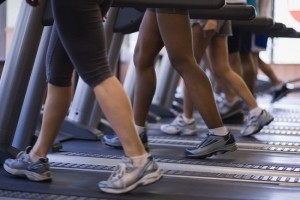What to Eat Before Training
It's fairly common to enter a gym setting and not know where to begin. This is obvious based on the number of gym newbies that venture straight to the treadmills.
[caption id="attachment_4838" align="aligncenter" width="300"] Treadmill: It's pretty hard to do it wrong.
A treadmill is pretty straight-forward. There's usually a large button marked 'Start' and if you were able to successfully navigate the parking lot, lobby and cardio area, it's safe to assume you are proficient in walking.
Hence the popularity of the treadmill. It's easy to start. You are able to watch your favourite show. It doesn't have to be very difficult. There are numbers to track the work you did.
And most importantly, no one will judge you for your technique on using a treadmill. I mean, c'mon, you're walking on a treadmill. But further still, nobody else at the gym really cares what you're doing or how you're doing it.
But that's a story for another time. Instead of talking to you about how people don't know how to get started once they get inside the gym there is another common issue people struggle with at the gym.
And that's what to eat before training.
Many people struggle with how they should fuel their body for training. And others know they should eat something yet feel nauseous part way through their workout.
If this sounds like you below are some tips to ensure you are optimally fuelled and not tasting your breakfast a second time.
Tip #1 - Ease Into It At this time of year many are getting starting on a training program for the first time or resuming one after a layoff. And with positive intentions they try to jump straight back in to where they left off. Or it could be a training partner that is leading the way and thinking they are helping you by challenging you to keep up.
If this sounds like you, ease up on the gas. There are 350 some days left in the year. There's no need to use up all your motivation and desire in week 1. This only leads to burnout, possible injury, frustration and the previous mentioned nausea.
Tip #2 - Look At What You Ate When you have a pre-workout meal you need to consider what it is you ate. Before training look to have primarily carbs with some protein and fat. Too much protein, fat or total calories and you'll feel sluggish.
In terms of carbs, these should be the moderate to slow digesting variety. Think of whole grain pancakes, oatmeal or toast. Pass on the eggs benny, egg white omelet or anything else high in fat or protein.
Tip #2 - Look At When You Ate Everybody is a little different but typically you want to give yourself about an hour to digest your fuel for training. If you are eating in the car on the way to a training session it could be that haven't given yourself enough time to digest your meal. Try pushing your meal earlier by 15 minute increments until you find the window that works for you.
Tip #3 - Look At How Much You Ate Maybe your eating complex carbs an hour before training but still feel bloated or nauseous. It could be that you're eating too much of the right stuff. For example, if you're in the habit of having 6 pancakes before training cut this back to 3 and see how you feel. You can slowly add one at a time until you found the amount of energy, i.e. calories, that you can tolerate before training.
Tip #4 - Look At The Form Of What You Ate Let's say you're eating complex carbs, the right amount and giving yourself an hour or more to digest. And you still having an unsettled stomach while training. You may benefit from trying a liquid versus a solid meal. Don't confuse this statement with thinking I'm telling you to break out your juicer and slam 10 fruits in for a pre-workout smoothie. This will give you too much fructose and fibre and not enough the right fuel you need for training.
Instead you still want this pre-workout drink to be primarily carbohydrate. My recommendation for something like this is Vitargo. A half serving gives you 35 grams of carbs, delivered to your cells faster than anything other product out there. There are zero grams or sugar or stimulants. Talk to us if you'd like to try a sample.
Tip #5 - Nothing New Your pre-workout meal is not the time to try a new food. As well, avoid anything that is spicy, overly sweet and may cause your GI to freak out. Remember you're eating for fuel not taste at this time. Don't worry if something is bland if you get through a great training session without distress and achieve your goal.
Keep these tips in mind as you look to fuel your body before training. If you experience GI distress or nausea, look to allow more time, reduce the amount of food and maybe try a liquid version.
Chris [fb-like]
When you subscribe to the blog, we will send you an e-mail when there are new updates on the site so you wouldn't miss them.

Comments